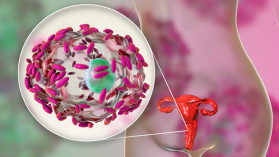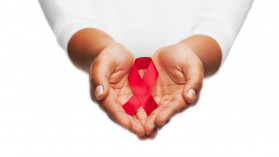Get Informed Topics Safer Sex & STIs Types of STIs GONORRHEA
GONORRHEA
What is gonorrhea?
- Gonorrhea is a sexually transmitted infection (STI) caused by a bacteria.
- It can affect the cervix, which is the opening to the uterus, penis, throat and the rectum which is inside your butt
- Gonorrhea is easy to transmit but also easy to cure if you do something about it quickly.
How do you get gonorrhea?
- Gonorrhea is found in certain bodily fluids of someone who has gonorrhea: semen or cum, vaginal fluid and anal fluid. Contact with any of these fluids can put you at risk of getting gonorrhea.
- You can get gonorrhea from having unprotected- meaning without a condom- vaginal, oral or anal sex with someone who already has it.
- You can get gonorrhea if you share sex toys with someone who already has it and you don’t disinfect the toys or put a new condom on them each time a new person uses the toys.
- A pregnant person with gonorrhea can pass it on to their baby during vaginal delivery.
How do you know if you have gonorrhea?
- The only way to know you have gonorrhea is to get tested.
- Some people do not have any symptoms and may not know they have it. You can pass on gonorrhea even if you don’t have any symptoms.
- Male and females will get symptoms in the first week after getting the infection.
- Women and girls do not have symptoms or the symptoms may be mistaken for a bladder or vaginal infection.
- Symptoms can vary depending on where the infection is.
Possible Symptoms
Vagina:
- Painful urination or peeing
- Bleeding between periods
- A change in vaginal discharge
- Pain during or after vaginal sex
Penis:
- Discharge from the penis that is thick and yellowish-green
- Painful urination
- Pain or swelling in the testicles or balls
Anus:
- Pain or itching in the rectum or butt
- Bleeding or discharge from the rectum
- Painful bowel movements or pooping
Throat:
- Possible sore throat or swollen glands but usually no symptoms at all
Remember: The most common symptom of any gonorrhea infection is no symptoms at all. The only way to know is by testing.
How & where can you get tested for gonorrhea?
- You can get tested for Gonorrhea in most public or private health facilities in your area. Find a clinic near you in the clinic finder here (Link)
- If you have a vagina, a clinician will do a vaginal exam and take a swab of your cervix. At some clinics, you can be tested by peeing into a cup.
- A Pap test is not a gonorrhea test, although they are often done at the same time.
- If you have a penis, you will be tested by peeing into a cup.
- To make sure your results are accurate, do not pee for 1-2 hours before doing the test.
- Gonorrhea in the throat or rectum is tested for by swabbing the area. A swab is like a long q-tip.
- If you want to be tested for gonorrhea, ask specifically for a gonorrhea test. Do not assume you will be tested for gonorrhea, even if you ask to be tested “for everything” or “every STI”.
- A pregnant person can pass gonorrhea on to their baby during vaginal childbirth. If you are pregnant and have not been tested for gonorrhea, talk to your prenatal care provider.
What if I test positive for gonorrhea?
- If you test positive for gonorrhea, it means you have it
- Gonorrhea can be cured with antibiotics. You should take all of your medication, even if your symptoms go away before you are finished taking it.
- Your sexual partners should also get tested and treated. If they don’t, they can give gonorrhea to you again.
- It is important to have a follow-up test after you have finished all your medication. Talk to your clinician about being re-tested.
- To make sure you don’t give gonorrhea to your sexual partners, wait for 7 days after you’ve taken all your medication to have sex again.
- It is important to treat gonorrhea. If left untreated, gonorrhea can lead to serious health problems. In women and girls, this includes Pelvic Inflammatory Disease which can lead to infertility, long-lasting pelvic pain and ectopic pregnancy (pregnancy that occurs outside the uterus). In men and boys, untreated gonorrhea can reduce fertility and cause pain and swelling of the testicles.
- Gonorrhea is a reportable infection. This means that if you test positive for gonorrhea, you may be called by a public health nurse to get contact information for current and past sexual partners so that those people may be encouraged to get tested. Your name is not disclosed when a sexual partner is contacted.
- You can also contact current and past sexual partners yourself.
.
How can you lower your risk of getting gonorrhea and/or passing it on to your partner(s)?
- Make informed decisions. Talk to your partner(s) about STIs and the use of safer sex tools, such as condoms, every time you have sex.
- Use condoms on penises or dildos for vaginal or anal sex, use latex gloves for finger play and fisting, and use condoms/dams for oral sex to lower your chances of getting or transmitting gonorrhea.
- If you are sharing sex toys, be sure to disinfect them or put a new condom on them when a new person uses the toys.
- Try to get tested for gonorrhea and other STIs when you or your partner has a new sexual partner. Or, if you have new partners often, think about STI testing every 3-6 months.
If you test positive for gonorrhea, follow your clinician’s instructions for treatment and follow-up.
Partner Notification
- If you are diagnosed with gonorrhea, it is important that you or someone from the public health department notify your past sexual partners so they can be tested and treated. Your name is not disclosed when a sexual partner is contacted.
Frequently Asked Questions
Male Body
1 questions
See frequently asked questions on Male Body
Let's Talk
Facts, tips, stories and common questions
Go to Forum




